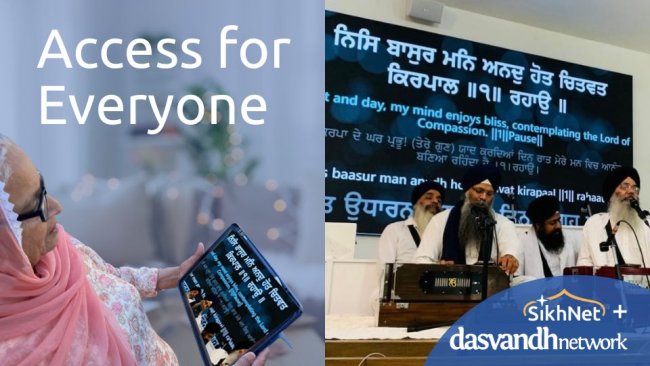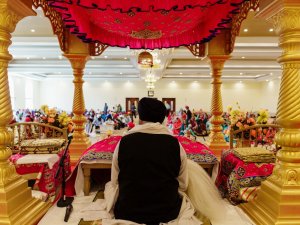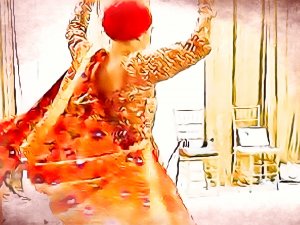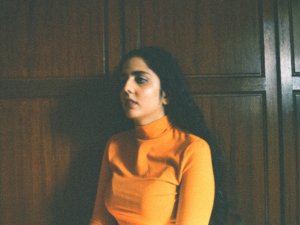Parvyn Kaur Singh is a singer, dancer, and musician from Melbourne, Australia. She has been performing globally with her father Dya Singh from a very young age, and later became the vocalist in the vintage Bollywood inspired band, The Bombay Royale. Parvyn’s current solo project synthesizes a lifetime of work and represents a new step in her career. Parvyn’s work is informed by electronica and jazz, her background in Sikh devotional music and her training in classical Indian music and dance. Her debut solo album “Sa’”will be released worldwide in Aug 2021.
I have a vague memory of meeting Parvyn when I was six years old in my childhood kitchen in Perth, Australia. She would have been touring with her family around Australia and I think my parents hosted them for lunch. This adorable Punjabi Alphabet track is how I would have defined our relationship back then. However, we really got to know each other when I moved to Melbourne as a twenty-something. We reconnected in the arts industry as brown sisters and collaborated on arts projects. We’ve shared the stage, meals and even hosted a radio show together! We’ve witnessed each other transform, grow, and move through different phases of our artistic and Sikhi practice. Which is why, when I think of Kaurs out there who are following a path less traditional to Sikhs in 2021 (but perhaps more traditional to our artistic and activist Sikh roots), I think of Parvyn: artist, earth mumma, and dear friend of mine.
Name: Parvyn Kaur Singh
Occupation: Artist (Musician, Dancer, & Educator)
Education: Monash University, Media and Communications & Journalism
When and how did you realize this was the career path for you? What was your career journey?
My father is a musician and I spent most of my childhood singing with him and later on, touring the world performing Gurbani on festival stages and at gurdwaras across North America, UK, Canada, Australia, Malaysia, Europe, India, and even Japan.
After I finished high school I hadn’t intended to have a career as a musician and started a chemical engineering and biotechnology double degree at Adelaide University (Australia). I quickly realised it wasn’t for me and deferred to go on tour with my dad and spent the year travelling and enjoying music. I started recording my own songs as demos that year and realised it was something I wanted to pursue. I re-enrolled for Media and Communication in Melbourne, where my sister was living, not because I wanted to become a journalist but with the intention I would be learning skills that would assist me in my music career but still be doing a university degree to keep my mum happy.
After touring with my dad for a few years, and doing my Uni through correspondence, I fell in love with a fellow musician and I started travelling to India to study North Indian classical voice and Kathak dance. Around that time I also got a call from Andy Williamson, a saxophone player, who was starting a vintage Bollywood inspired band and he was looking for a female singer.
I remember walking into this fairly small rehearsal studio space in Melbourne and there were 8 white guys playing music from my childhood like Dum Maro Dum and Yeh Mera Dil. I went on to recording three albums with The Bombay Royale, doing numerous video clips, toured Australia and the world, playing some of the biggest gigs imaginable like the Glastonbury Festival – with people as far as I could see in front of the stage dancing and cheering for our band.
I never really decided that music was what I would do in life until now. There are many aspects to a career in the arts that keep it a sustainable way of surviving and making an income. Diversity in income streams has been important. For example, I’m also a cultural educator and I travel to schools across Australia and New Zealand with my husband, performing an interactive music and dance show for children of all ages.
Right now is an interesting time in my career because of the forced pause created by the pandemic. The momentum that had been growing over the last decade came to a halt and the space left needed to be consciously filled by a clear intention of my future career plans. I decided to pursue a new solo project that I have complete creative and administrative control over. It has required me to step up and commit to my art in a way I have not done before both artistically and economically. I have recently finished my first full length album and I am currently gearing towards release.
What do you enjoy most about your job?
Having the freedom to dictate my own life as my own boss is both challenging and rewarding. Essentially I am a small business owner and entrepreneur whose main focus is creating beautiful art in the world. Practising my art (which is also my hobby) as my job is amazing! It feels like a valuable way of spending my time on Earth hopefully adding to humanity in a positive way.
I also love the people who I come across through my work. The arts community is a beautiful space to nurture good in the world and I am so grateful to be surrounded by people that inspire and support me to be whatever I want to be and express myself in whatever way is true for me.
Considering it is nontraditional, what were your parents’/family’s/ sangat’s reaction to your career choice? If negative, how did you deal with their response?
I think because my dad was already a musician breaking traditions, following in his footsteps hasn’t been a big deal in the community. I have always been taught to be strong, think clearly and rationally, and make decisions for myself. I am intelligent, hard working, and in control of the environment around me and I’ve created a life that suits me best. Some people might think of my life, as a travelling gypsy or living a simple life in a small cottage surrounded by greenery with no television, as unusual or not something to strive for, but for me it’s a healthy way of living. It’s what we need to be doing for the continuation of human life on this planet in the current climate crisis.
How do you balance family and work and hobbies?
Balancing work and hobbies when your work is your hobby can be difficult and I do struggle with feeling like even in my ‘downtime’ I am still working. I can get a bit obsessive and do have to make an effort to consume art for the fun of it. I am always learning and whether it’s watching a movie, scrolling through Instagram, going to a concert or reading a book, I tend to relate it back to my work or at least consider it as part of my experience that will inevitably come out in my creativity at some point.
My family is definitely an outlet for distraction and life beyond my work. Playing netball with my sisters, having family dinner catch ups and movie days with my niece and nephews brings me such joy. I think having that extended support network of people that can organise events or get me out of the house when they see I’m getting too consumed with my work is important because sometimes I need reminders.
I am also very aware of my responsibilities as a mother and a partner, and do not take for granted the need to work as a team within the household to live in a clean and healthy space. Making sure we are all comfortable and happy, providing for the needs of my child will always be my number one priority but I am a part of that “we” so taking care of my happiness and needs is an important part of that. I can not look after others if I am not caring for myself. Doing yoga, the odd foot spa and facial mask, helps keep me in balance.
How do you feel Sikhi inspires your work?
So much of who I am, my identity, my history, my pride, my belonging, what makes me special, unique and strong comes from my upbringing in Sikhi. Stories of men and women doing what is right and fighting for not just themselves but for others inspire me and give me a benchmark of greatness. Feeding people, educating, making an impact and standing out and being the best you can be are all things I got from Sikhi.
Following and seeking truth and unconditional love is what drives me and what I am trying to do through my work. My current project is a personal reflection of some of my journey so far but as I continue to make more albums I hope to spread all of the beautiful messages in Gurbani I’ve been taught, even further.
What elements of Sikh values are in your work?
Being a good person, loving all humanity, living an honest life, working hard, striving for excellence and reaching a point of serenity and contentment (Chardi Kala) is what I achieve through my music. Music is my naam, my sanctuary, my peace. It gives me joy and my hope is to share that joy with others who listen and connect with people in a true and wholesome way.
What lessons have you learned about Sikhi through your work?
Living the Sikh life is not easy. Sometimes it feels easier to succumb to darkness, temptation, laziness, mediocrity, or selfishness. But I feel like through my work I am beginning to understand the burning desire from within to be better and to do better not just for yourself but for the people around you, the wider community and for all humanity. The values of Sikhi are universal and can be reached through many different mediums. An artist’s role in society is to reflect on the times and make people aware of themselves in ways they may have forgotten or blinded by a materialistic pursuit of success. I think that is what our Gurus were doing in their time. Waking people up to the imbalance of power and giving people hope, a source of comfort, support and strength in difficult times. And when words and music were not enough, they picked up their swords and fought.
What advice do you have for young Kaurs who are unsure of what career they should pursue?
What makes you happy? What do you feel is a worthy way of spending your time, energy, love, sweat, and tears over. What will keep you content, but give you space to grow, discover, and be the best person you can or want to be? It doesn’t have to be glamourous (and even careers that might look like it from the outside rarely are). It doesn’t have to be cutting edge. It doesn’t have to pay you millions of dollars. Keep life as simple as you can. Do not over commit but also rise up for a challenge when you can. Try and find something that each night when you sleep you can be proud of the days work you have done. Foster the relationships of the people around you to be wholesome, honest and good and try to live a life that is sustainable for the planet and makes a positive impact on humanity.
Follow Parvyn
Website: https://www.parvyn.com
Facebook: https://www.facebook.com/parvynmusic
Instagram: https://www.instagram.com/parvynmusic






